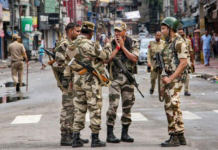
Close on the heels of the Delhi Police registering a case over a “doctored video” of Home Minister Amit Shah promising to abolish quota, Tehelka reporters investigated how misinformation through deepfakes using Artificial Intelligence was being spread for a price. In this case, Telangana Chief Minister Revanth Reddy has been summoned for questioning by police following complaints by the Ministry of Home Affairs. The Delhi Police had on April 28 registered an FIR under Sections 153, 153A, 465, 469, and 171G of the IPC and Section 66C of the IT Act and had also sent notices to X and Facebook Almost at the same time, a Delhi court issued a fresh summons to the BBC in a case involving the controversial BBC documentary concerning PM Modi.
Tehelka’s Cover Story ‘Peddling lies for a price’ unveils the challenge posed by deliberate dissemination of misinformation during polls, with digital marketing companies eager to play along for profit. A marketing company claimed on camera that “For spreading misinformation during elections, we don’t need any facts or evidence to work on. The Election Commission of India can’t trace these bot accounts. This is our guarantee.” Deepfakes use AI algorithms to generate videos, audio recordings, or images that look and sound real to blur the line between reality and fabrication. The morphing tools are used to harm reputations and influence polls.
There have been a slew of deepfake incidents in recent times including the one involving cricket legend Sachin Tendulkar, in a fake AI-generated video showing him promoting a gaming app. Actors such as Aamir Khan, Rashmika Mandanna, Katrina Kaif, and Ranveer Singh have found themselves at the receiving end of this technological mischief. Globally, deepfake videos of former US President Bill Clinton and current President Joe Biden were fabricated and circulated during the presidential elections. Similarly, a deepfake video of Ukrainian President Volodymyr Zelensky urging soldiers to surrender in their fight against Russia was shared on social media.
A recent report by the cyber security company McAfee finds that nearly 75 per cent of Indians have encountered deepfake content, with most concerned about the potential use of Artificial Intelligence (AI)-powered deep fakes for impersonating public figures to influence elections. It is time to hold both the creators and disseminators accountable for deepfakes. Technology has to be responsible to benefit society and ward off anti-social elements. People must be sensitized to the perils of sharing or forwarding such fake content on social media. Several countries have come out with legislation to mitigate the risks – the UK’s Online Safety Act criminalizes sharing deepfake porn, China has banned the production of deepfakes without user consent, and South Korea has made it illegal to distribute deepfakes. In India, which has over 80 crore internet users, there is a need to scrutinize the existing provisions to blunt this new weapon of image destruction and the creation of false narratives.












